Sectors
Thesaurus : Doctrine

Complete reference : BRAUDEL, Fernand, La Dynamique du capitalisme, Arthaud, 1985, reprint. Flammarion 1989, Paris, 107 p.
Read the coverback (in French).
Read the table of content (in French).
Thesaurus : Doctrine

Complete reference : Manent, Pierre, Histoire intellectuelle du libéralisme, Calmann-Lévy, Paris, 1987 ; reprint, coll. "Pluriel", Fayard, 2012.
Read the coverback (in French).
Read the summary (in French).
Read the foreword (in French).
Thesaurus : Texts
Links : France
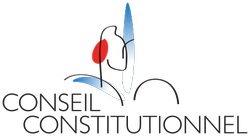
http://www.conseil-constitutionnel.fr/
The Conseil constitutionnel (French Constitutional Council) was established by the Constitution of the French Fifth Republic, dated 4 October 1958. It is a court with a variety of missions, including compliance control of the law to the Constitution.
It operates a priori control of French laws but also a post-control of laws since 2008.
The French Constitutional Council regularly makes important decisions on Regulation.
Links : United States of America

441 G Street Northwest Washington, DC 20548 UNITED STATES Phone : (202) 512-6000
Compliance and Regulation Law Glossary

Compliance and Regulation Law Glossary

Regulation presupposes that we move from a political conception of Act (that is to say a collective Decision expressed by the State) or a civilist one (that is, a will expressed by one or several individuals in one Contract) to an economic vision of trading organizations whose action is the expression of the market. If one relies on the adjustment of supply and demand, that is to say, the meeting of desires and interests, there will be "self-regulation", which is the "Law of the Market ", referring to competition law. The act of the operators is only a reflection of this law, in action.
La Régulation est alors plus complexe car elle vise autre chose que cette rationalité mécanique, soit en raison d’une défaillance du marché (par exemple en cas de monopole naturel) soit parce qu’on veut obtenir plus que ce que le marché peut donner (par ex. l’accès de tous à des biens communs, comme la santé, même pour des demandeurs insolvables). Dans ce cas, sont élaborées des règlementations, interventions ex ante désignées en anglais par le terme regulation. La règlementation est adéquate si elle incite des agents économiques à adopter des comportements qui concrétisent le but recherché par l’auteur de la règlementation.
Regulation is then more complex because it aims at something other than this mechanical rationality, either because of a market failure (for example in the case of a natural monopoly) or because it wants to obtain more than the market can give ( Eg access to common goods by all, such as health, even for insolvent claimants). In this case, regulations are drawn up, ex ante intervention. The regulation is adequate if it encourages economic agents to adopt behaviors that concretize the aim sought by the author of the regulatory mechanisms.
This strategic use of law then requires the necessary detour through the economic analysis of law, that is to say the analysis of law in its economic effects.
This discipline created in the United States by Ronald Coase (Nobel Prize for Economics in 1991) can be merely descriptive and reveal what economic effects the law produced. This conception, which is that of Richard Posner, makes the economic analysis of law an instrument of expertise for the political decision-maker, who can take this into account if it is necessary to modify the rules. A more radical conception of the so-called "normative economic analysis of law" is to argue that the conclusions of the analysis would oblige the decision-maker to follow it.
The issue is decisive because in the first case the law and the jurists - in particular the Legislator and the judge - still have an autonomous existence, in the second case they no longer exist, they are no more than the binding and explicit form of the "Law of the market" whose nature is a-legal.
Even in its descriptive form, economic analysis of the law is generally rejected in France in that it disregards the role of the law in that it carries moral values. It is in reality to ignore its merely descriptive, instructive and useful function, and the fact that it opens instead the amplitude of the rational choice offered to political decision-makers. Moreover, regulation is not only a technical discipline, it is also a political and philosophical issue. Descriptive economic analysis is more appropriate to it than normative economic analysis of the law, which claims to vassalize or even destroy other disciplines, which are substantially unknown.
Compliance and Regulation Law Glossary

The concept of 'agency', sometimes confused with the one of 'Regulator', designates a way of deconcentrating the State. Away from a Jacobin outlook, states have indeed gradually devolved their sovereign responsibilities to other institutions, which are often geographically distant from the state's political capital city. These agencies are a form of technical decentralization because they are in charge of operational tasks and specific expertise, e.g., as regards employment, environment or health issues. This model, which is very common in Scandinavian countries, is often associated with federal outlooks, like in the United States. It is still fairly remote to the French model that remains to this day built on the idea of a centralized state. So far, France has only developed a few agencies (e.g., France Trésor, tasked with managing France's government debt and cash positions, or the Regional Health Agencies).
In a different perspective, although the two notions are homonyms, the American financial theory developed the notion of 'agency' to describe the relationship between the corporate officer (the agent) and the shareholder (the principal), who empowers the first to act on his behalf to serve his interest. Information asymmetry and conflict of interest mark this relationship, which explains that this theory helped developing multiple safeguards, conveyed by the Financial Regulation.
Feb. 11, 2020
Breaking news

Jan. 15, 2020
Thesaurus : 02. French Court of Cassation
June 28, 2019
Breaking news

It is often observed, even theorized, even advised and touted, that Compliance is a mechanism by which public authorities internalize political (eg environmental) concerns in big companies, which accept them, in Ex Ante, because they are rather in agreement with these "monumental goals" (eg saving the planet) and that this shared virtue is beneficial to their reputation. It is observed that this could be the most successful way in new configurations, such as digital.
But, and the Compliance Mechanism has often been brought closer to the contractual mechanism, this is only relevant if both parties are willing to do so. This is technically true, for example for the Deferred Prosecution, which requires explicit consent. This is true in a more general sense that the company wants to choose itself how to structure its organization to achieve the goals politically pursued by the State. Conversely, the compliance mechanisms work if the State is willing to admit the economic logic of the global private players and / or, if there are possible breaches, not to pursue its investigations and close the file it has opened, at a price more or less high.
But just say No.
As in contractual matters, the first freedom is negative and depends on the ability to say No.
The State can do it. But the company can do it too.
And Daimler just said No.
___
Publicly, including through an article in the Wall Street Journal of June 28, 2019.
The company sets out in a warning to the market that it is the object of a requirement on the part of the German Motor Authority (Kraftfahrt-Bundesamt) of an allegation of fraud, by the installation of a software, aimed at misleading instruments for measuring emissions of greenhouse gases on cars using diesel.
It is therefore an environmental compliance mechanism that would have been intentionally countered.
On this allegation, the Regulator both warns the company of what it considers to be a fact, ie compliance fraud, and attaches it to an immediate measure, namely the removal of the circulation of 42,000 vehicles sold or proposed by Daimler with such a device.
And the firm answers : "No".
_____
Which is probably only beginning, since a No ends the dialogue of Ex Ante to project in the Ex Post sanction procedures, calls 6 observations:
- 1. No doubt Daimler, a German car manufacturing company, has it in mind in this allegation of fraud calculating pollution of its diesel cars what happened to his competitor Volkswagen: namely a multi-billion dollar fine, for lack of compliance in a similar hypothesis (so-called dieselgate). The strategic choice that is then made depends on education through the experience of the company, which benefits as such from a previous case that has had a very significant cost. Thus educated, the question is to measure the risk taken to refuse any cooperation, when the company can anticipate that it will still result in such an amount ....
- 2. In addition, we find the difficulty of the distinction of Ex Ante and Ex Post. Indeed, saying No will involve for the company a cost of confrontation with the Regulator, then the peripheral jurisdictions or review courts. But in Germany, the Government itself, concerning a bank threatened with compliance proceedings and almost summoned by the US regulator to pay "of its own free will" a transactional fine, felt that this was not normal, because it must be the judges who punish, after a contradictory procedure with due process and after established facts.
- 3. However, this is only an allegation, of probable assertions, of what legally allows to continue, but which does not allow to condemn. The confusion between the burden of proof, which presupposes the obligation to prove the facts before being able to sanction, and the burden of the allegation, which only supposes to articulate plausibility before being able to prosecute, is very damaging, particularly if we are committed to the principles of Repressive Law, such as the presumption of innocence and the due process. This distinction between these two probationary charges is at the heart of the probatory system in the Compliance Law. Because Compliance Law always looks for more efficiency, tends to go from the first to the second, to give the Regulator more power, since businesses are so powerful ....
- 4. But the first question then arises: what is the nature no so much of the future measure to be feared, namely a sanction that could be taken later, against Daimler, if the breach is proven, or which will not be applied to the firm if the breach is not established; but what is the nature of the measure immediately taken, namely the return of 42,000 vehicles?
- This may seem like an Ex Ante measurement. Indeed, the Compliance assumes non-polluting cars. The Regulator may have indications that these cars are polluting and that the manufacturer has not made the necessary arrangements for them to be less polluting (Compliance) or even organized so that this failure is not detected ( Compliance fraud).
- This allegation suggests that there is a risk that thiese cars will polluting. They must immediately be removed from circulation for the quality of the environment. Here and now. The question of sanctions will arise after that, having its procedural apparatus of guarantees for the company that will be pursued. But see the situation on the side of the company: having to withdraw 42,000 vehicles from the market is a great damage and what is often called in Repressive Law a "security measure" taken while the evidence is not yet met could deserve a requalification in sanction. Jurisprudence is both abundant and nuanced on this issue of qualification.
- 5. So to withdraw these cars, it is for the company to admit that it is guilty, to increase itself the punishment. And if at this game, taken from the "cost-benefit", as much for the company immediately assert to the market that this requirement of Regulation is unfounded in Law, that the alleged facts are not exacts, and that all this the judges will decide. It is sure at all whether these statements by the company are true or false, but before a Tribunal no one thinks they are true prima facie, they are only allegations.
- And before a Court, a Regulator appears to have to bear a burden of proof in so far as he has to defend the order he has issued, to prove the breach which he asserts exists, which justifies the exercise he made of his powers. The fact that he exercises his power for the general interest and impartially does not diminish this burden of proof.
- 6. By saying "No", Daimler wants to recover this classic Law, often set aside by Compliance Law, classic Law based on burden of proof, means of proof, and prohibition of punitive measures - except imminent and future imminente and very serious damages - before 'behavior could be sanctioned following a sanction procedure.
- Admittedly, one would be tempted to make an analogy with the current situation of Boeing whose aircraft are grounded by the Regulator in that he considers that they do not meet the conditions of safety, which the aircraft manufacturer denies , Ex Ante measurement that resembles the retraction measure of the market that constitutes the recall request of cars here operated.
- But the analogy does not work on two points. Firstly, flight activity is a regulated activity that can only be exercised with the Ex Ante authorization of several Regulators, which is not the case for offering to sell cars or to drive with. This is where Regulatory Law and Compliance Law, which often come together, here stand out.Secundly, the very possibility that planes of which it is not excluded that they are not sure is enough, as a precaution, to prohibit their shift. Here (about the cars and the measure of the pollution by them), it is not the safety of the person that is at stake, and probably not even the overall goal of the environment, but the fraud with respect to the obligation to obey Compliance. Why force the withdrawal of 42,000 vehicles? If not to punish? In an exemplary way, to remind in advance and all that it costs not to obey the Compliance? And there, the company says: "I want a judge".
______
Dec. 13, 2018
Events : JoRC
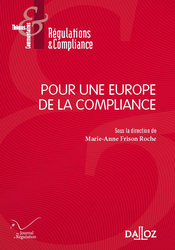
Nov. 15, 2018
Events : JoRC

Oct. 4, 2018
Events : JoRC

Sept. 6, 2018
Events : JoRC

July 19, 2018
Releases : I. Isolated Articles

May 30, 2018
Events : JoRC

March 20, 2018
Events : JoRC

March 3, 2018
Events : JoRC
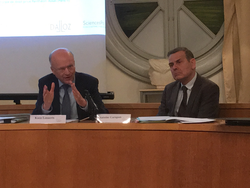
On 2 March 2018, Koen Lenaerts came to an amphitheater at the University Panthéon-Assas (Paris 2) to inaugurate the series of conferences organized by the Journal of Regulation & Compliance (JoRC), a cycle that has the general title: Pour une Europe de la Compliance (For the Europe of Compliance). The School of Public Affairs of Sciences Po, the Department of Economics of Sciences Po, the Ecole doctorale de droit privé (Doctoral School of Private Law) at the Université Panthéon-Assas- Paris 2 (Panthéon-Assas University - Paris 2) and the School of Law of the University Panthéon-Sorbonne (Paris I), are associated with this cycle. Many personalities will take the floor. They will give contributions for the book that will be published in the Régulations & Compliance Series edited by Marie-Anne Frison-Roche at Éditions Dalloz.
After an admirable lecture offered by Koen Lenaerts, Antoine Garaponfootnote-94, secrétaire générale de l'Institut des Hautes Études pour la Justice (Secretary General of the Institute of Higher Studies for Justice), reacted perfectly in "premier discutant", stressing as everyone his great interest in listening to the demonstration made by the President of the Court of Justice.
He felt that it was hardly possible to speak of "Compliance Law"!footnote-91, because it is above all a Law that ceases to be "prescriptive" to become "relational" ", companies organizing themselves to put goals that are reached in relation with the public authorities. Companies thus develop a "systemic Law" that develops on its own, with alert mechanisms put in place directly by companies that care before the continuity of their economic activities. The notion of third parties disappears, a sort of "direct government" takes the place of the "indirect government" represented by the "third party", the companies having integrated this third party into their own organization, which upsets their relation to time and puts in place a "metajuridic" system.
Antoine Garapon then asks the question of how such a "conversion" could take place, that is to say, this transition of control systeme from the Ex Post mode to the Ex Ante, resulting in companies internalize the task of effective rules!footnote-92. He believes that on the one hand, the system that advocates it has the "market power to impose it and, on the other hand, those who demand it in this system make a" vision of the world "explicit. Antoine Garapon adds the need for a "moral ambition".
However, Antoine Garapon pointed out the United States have met these three conditions.
In his discussion, Antoine Garapon, on the other hand, felt that Europe did not bring them together and that Europe "starts with a handicap", because it does not consider worlwide, because it has no vision of the world, because it has not operated on moral integration.
He insisted that the Court of Justice can carry these three conditions, especially with regard to personal data. Because this is about the digital that Europe has a market power. It is about personal data that the Court of Justice is the place where Europe is both a market and values!footnote-93.
This is why the Court of Justice of the European Union does have a central role for this construction.
______
These very constructed, very instructive remarks of Antoine Garapon, thanks to him, perfectly showed, in mirror of the conference of the President of the Court of Justice, the stake: the future.
Beyond the disputatio around the definitions, it is indeed the question of whether or not Europe will build its own compliance mechanisms.
By finding a vocabulary of its own. Not only in French, because the Law is made of words, but also with new words, which leave us "translated-glued" and which will carry European ambitions, as it was the case for the "right to be forgotten" ", very often quoted in the discussion.
Of course, this presupposes "power". But we must already pretend. And the Law has always claimed to pretend. It is in this that it is an Order. This is probably why President Koen Lenaerts insisted on the "juridicization" of compliance, as does the hand of Law that arises on an object.
March 3, 2018
Events : JoRC
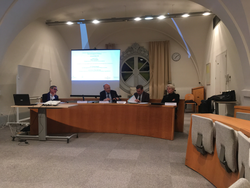
Among all the things that were important to remember, one of the things that struck me most in the extraordinary conference of the President of the Court of Justice of the European Union Koen Lenaerts on "Europe of the Compliance "held on March 2, 2018 was his ability to make" live Europe ". Not only to make it understand but also to make it "live". Here is the challenge: that compliance is not an accumulation of processes without reason and without flesh, but a living whole taking its meaning into consideration of the human being, a person whose judge is concerned.
On 2 March 2018, Koen Lenaerts therefore came to an amphitheater at the University Panthéon-Assas (Paris 2) to inaugurate the series of conferences organized by the Journal of Regulation & Compliance (JoRC), a cycle that has the general title: Pour une Europe de la Compliance (For the Europe of Compliance). The School of Public Affairs of Sciences Po, the Department of Economics of Sciences Po, the Ecole doctorale de droit privé (Doctoral School of Private Law) at the Université Panthéon-Assas- Paris 2 (Panthéon-Assas University - Paris 2) and the School of Law of the University Panthéon-Sorbonne (Paris I), are associated with this cycle. Many personalities will take the floor.
Presented by Professor Thierry Bonneau, the conference made by President Koen Lenaerts was extremely rich and solid, perfectly constructed. Everyone had known the quality of the conference to be delivered by the President of the CJEU. The content of his demonstration will be found in the article he will give for the book that will be published in the Régulations & Compliance Series edited by Marie-Anne Frison-Roche at Éditions Dalloz. And the reader will find all the strength of this demonstration. This is necessary to venture into this area of "Compliance" : Koen Lenaerts recalled that we were still looking for the definition and a French term that would do justice to a satisfactory definition!footnote-90. This question was echoed by Antoine Garapon in his discussion.
Embodying the firmness that must be shown when words are uncertain, President Koen Lenaerts emphasized that the European Union is based on "Rule of Law". This means that the behaviors must respect Law. For that, - and that is why it is necessary to take in the literal sense the English expression "to comply with", the enterprise must not be passive but to make sure that its behavior is actually respectful of legal prescriptions. In this, there is a general paradigm shift, which inverses the relation betwenn the operator and the rules, from the Ex Post to the Ex Ante!footnote-89 as the entreprise has to be itself active to secure the effectiveness of the rule of Law. This internalization of the rule by the company develops both a procedural culture and a behavioral culture, in which companies can express an ethical dimension and build a "Trust Pact" !footnote-88 with states and public authorities. This change has been brought about by globalization, since states no longer have the means to impose ethical norms of behavior on businesses through the Ex Post intervention of their jurisdiction, but States like companies are gaining the benefit of this internalisation of rules in compagnies because the Compliance is inseparable from the accountability by which the company is compelled to justify that it actually tends to achieve the overall goals assigned by the public authority.
Thus, after exposing the general movement by which Europe opened up to this upheaval, President Koen Lenaerts took on three technical dimensions crossed by this new conception. The first is the Financial Markets Law. The second is Competition Law, about which the President has notably developed the Court's reflections on whether the adoption of a compliance program by an enterprise found to have violated Competition Law, in particular by "negligence" is neutral, or constitutes a mitigating circumstance or constitutes an aggravating circumstance. This question was taken up after the presentation in the discussion with the room. The third is that of personal data. Taking again as in a waltz with three times his remarks, the president of the Court of Justice found that the compliance, whereas it consists in transforming the Ex Post into Ex Ante becomes juridicalised and in this the Court of justice holds its not only in Europe but also in relation to the world, without however ever forgetting that it is the States that are drawing up the rules that are the foundation of Europe.
We will find in the article that will be published all these precious elements and no doubt that the elegance of the pen will be equal to that of speech.
But, written exercise requires, the reader will not find what we had the chance to attend: the story of two cases by the one I would prefer to name the "Professor Koen Lenaerts".
Two famous cases, which we teachers, comment and remind in our courses, that students learn and recite, quote in their copies. But never that way.
The first case is the Schrerms case, where the court said that Facebook could not transfer this person's personal data to the United States since he was opposed to it. To make it clear, the President revived it through the litigant, who was a student and for this reason he spoke directly to the students present in the amphitheater. He pointed out that the plaintiff at the origin of the case was a law student, like them. He detailed his situation in Austria, making some quotes in perfect German, pointing out that this student was now at the doctoral stage, inviting students to be brave, as he was. At each episode of the story, the speaker told the students, making some detours on his own student life because finally we were all in family ... Alma Mater. But his hands were telling the story even more: they were thrown themselves into the story, they brewed the space, it seemed as if they themselves were no more grandiloquent than the speaker but found their place exactly , in a magisterial position. Yes, here is a president in front of which companies have a hard time hiding the truth, a president with such firm hands and whose torso does not move but turns to the left and right to talk to everyone.
The second story was even more beautiful. The Google Spain case, I know it. I even know it by heart. I read it, commented on it, cited it a lot of times ... But all of a sudden that's what happened to a small Spanish merchant: President Koen Lenaerts told us his story, and I rediscovered the case. A small Spanish shopkeeper, whose name the speaker uttered in perfect Spanish, obtained from the Court of Justice that his "right to be forgotten" was recognized. President underlined the apparent paradox of his insistence for the appearance of his surname in the judgment by which this person had thus obtained the erasing of his surname! Yes, I did not notice ... Why did he ask for the mention of his name in the right to have his name deleted? Because it's a matter of honor. This is what the speaker insisted: do not joke with honor. And if you do, even Google will lose.
The merchant had been subject to a forced property sale procedure because of financial difficulty, which spanish newspapers had echoed. His honor was been trampled. Then, by a happy return of fortune, he had recovered his property, his prosperity, his reputation. But from that, the press had not talked about it. Some lines in a newspaper of legal announcements, but that it is nothing for the human soul. That's why he wanted these mechanical digital links to disappear, which always and for all end up with articles presenting him as a wretch without ever ending up with articles presenting him as a prosperous merchant (because of the non-existence of these second articles).
The speaker emphasized this dimension very much. And we know that the General Regulations that will come into force in May 2018 on personal data, which intrigues so much the Americans, draws in the judgment Google Spain its main solution in the matter: this "right to be forgotten" , subjective right so strange.
He emphasized this dimension very much. And we know that the General Regulations that will come into force in May 2018 on personal data, which intrigues so much the Americans, draws in the judgment Google Spain its main solution in the matter: this "right to be forgotten" , subjective right so strange.
Listening to President Koen Lenaerts, how not to think of Carbonnier? to his articles of it, especially on sociological rule : "small causes, great effects"?
From this conference, it will remain a great article, but as in the theater, where the ephemeral is part of the beauty of this art, what were these two stories, told by the one who knew how to listen when it was necessary to decide the two cases, stories told with the two firm hands that danced inviting students to enter this round, even as the President of the Court of Justice had to leave immediately to Luxembourg to hold such heavy obligations, yes it was simply beautiful .
March 3, 2018
Events : JoRC
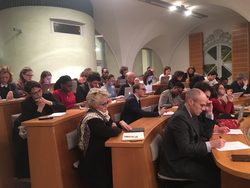
During the discussion that followed the inaugural conference for the Cycle Pour une Europe de la Compliance (For a Europe of Compliance) that Koen Lenaerts devoted to the role of the Court of Justice of the European Union in the construction of the Europe of Compliance, and after a first discussion led by Antoine Garapon, a problem has particularly emerged.
Indeed, President Koen Lenaerts has taken up the question of the influence of the adoption of a "compliance program" by a company when subsequently anticompetitive behavior is imputed to it.
Competition or regulatory authorities, as well as courts, have three possibilities: either to consider that the company had done what it could to prevent this behavior, to educate the persons in its charge, that this prevention not enough but must be taken into account in its "discharge" to lighten its sanction; on the contrary, to consider that the adoption of such a compliance program by the enterprise by which it expresses its express and pro-active desire to bear the efficiency of the standard itself while at the same time it disregards it constitutes an aggravating circumstance of its responsibility; consider that the fact must remain neutral in the judge's assessment of the behavior.
The Court of Justice stands by the third solution.
But everyone agrees that this is an essential question for which the arguments are well-founded, the European Commission, on the other hand, leaning towards the qualification of an aggravating fact.
During the discussion, it was emphasized in the opposite direction that in the perspective of Compliance as an incentive mechanism, not taking into account on the part of companies the adoption of such expensive programs is very discouraging for them. Moreover, this contradicts the definition of compliance as a "Trust pact" between the company and the public authority.
____
QWhat can be done to remain from this discussion of a very great interest?
So it's a question that is still open, because the arguments are strong and we could say that "everyone is right", and companies that want to take note of their behavior, and authorities who can not be abused by what would be only a screen of behavior violating Law.
The question is maybe whether the choice of "neutrality" of the Court of Justice is a solution of waiting or a decision of non-choice, because one could never know if a company is "sincere" or not when it has adopted a Compliance Program.
It is probably here that a solution could be found: in probative mechanisms. Because in these matters, it is by technical processes by which the subject of law (that is to say the company) reveals that it has done everything to achieve the Compliance purpose (obligation of means strengthened). ).
It is probably by formulating probative requirements of this kind that the Court of Justice could move out of its position of neutrality. While it is true that the judge must be "impartial" in relation to the facts, the attitude of giving no "relevance" to a fact as important as the compliance programs is inherently annoying. It seems difficult to associate a substantive rule, nor is it desirable to practice casuistry. But, because Economic Law lends itself to it, a probationary system that the Court would make clear would perhaps be a good solution.
____
Dans l'ouvrage qui paraîtra à la fin du cycle de conférences, un article sera inséré dans l'ouvrage sur cette question plus particulière de la portée des programmes de conformité sur l'appréciation du comportement de l'opérateur au regard des faits qui lui sont reprochés, question sur laquelle les différents régulateurs des différents systèmes juridiques divergent.
In the book that will be published at the end of the conference cycle, an article will be inserted in it on this particular question of the effects of compliance programs on the appreciation of the behavior of the enterprises with regard to the facts that are reproached, an issue on which the different regulators of the different legal systems diverge. For the moment.


